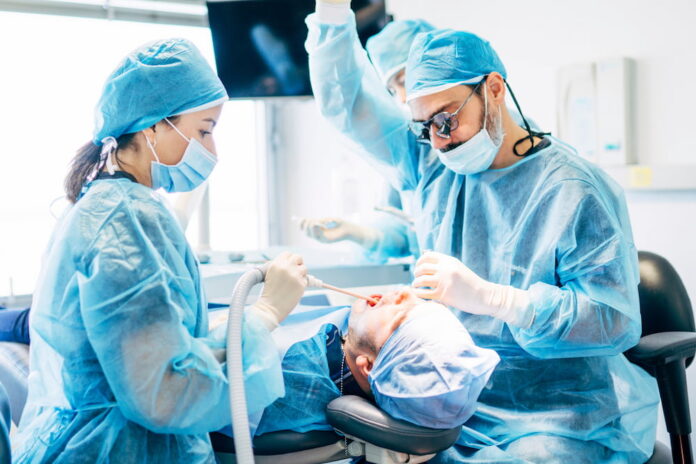Dental sedation relaxes patients who anticipate procedures with extreme anxiety. It’s recommended for various dental work that takes more than 30 minutes to perform. In addition, it’s used for patients who need to control their movements or manage their anxiety.
Oral health affects your general health in many ways. Hence, managing your phobias is essential because it can prevent you from getting the appropriate care. Meanwhile, procrastinating can lead to tooth loss, gum disease, or more costly procedures in the future.
Dental sedation is generally safe. However, it should only be done by experts with the proper equipment and setting.
What Is Dental Sedation?
Numbing and keeping a patient calm are very important to the successful outcome of a dental procedure. Sitting in a dental chair, anticipating the pain, or even just imagining the sound of the drill may be uncomfortable for some but horrifying for others.
There are three types of dental sedation: oral, nitrous gas, or intravenous (IV). Dentists manage patient anxiety by injecting a dental block to numb mouth sections or with pain free sedation. It’s necessary to inform your dentist of any medications you’re taking and any medical conditions you have before the procedure. This step can help them ensure the sedation is safe for you.
What To Expect During Oral Sedation
Oral sedation is used for mild sedation. A benzodiazepine pill or a similar drug is taken an hour before the dental procedure. During the procedure, the patient will likely feel relaxed. Under oral sedation, the patient can still reply to questions and follow instructions.
Meanwhile, this type of sedation may require anaesthesia for pain relief in cases like tooth extractions, dental surgery, or root canal.
Precautions
Some people may not be suitable candidates for oral sedation. These include individuals with the following health conditions:
1- Respiratory or lung problems, such as chronic obstructive pulmonary disease (COPD) or asthma, as sedatives can depress breathing;
2- Sleep apnea can be made worse by sedatives;
3- Certain heart conditions, such as heart failure or low blood pressure. Sedatives can lower blood pressure;
4- Liver or kidney problems, as these organs are responsible for breaking down and eliminating the sedative from the body;
5- A history of allergies or reactions to sedatives;
6- Pregnant or breastfeeding women, as the effects of sedatives on the developing fetus or nursing infant are still vague.
If you have any of the above conditions or are taking some medications, your dentist will likely recommend alternative sedation or anaesthesia, such as nitrous oxide or IV sedation.
Post-Procedure
After the procedure, the patient may feel sleepy or disoriented for a short period. Hence, they should have someone to drive them home. It’s also necessary to avoid alcohol and other sedatives for at least 24 hours after the procedure.
What To Expect During Nitrous Oxide Gas Sedation
Also known as laughing gas, this colourless and odour-free mild sedative doesn’t make you laugh. Nitrous oxide (NO) mixed with oxygen administered by a mask over the nose reduces anxiety and manages pain. The patient breathes in the mixture and should feel its effects within a few minutes.
Nitrous oxide relaxes the nervous system, so expect to be drowsy and relaxed. Under this sedation, the patient is fully conscious and can follow instructions throughout the procedure. It offers excellent sedation for people with a strong gag reflex. It’s also safe for children.
The effects of nitrous oxide are relatively short-lived and wear off quickly once the patient stops inhaling the gas or starts breathing pure oxygen. This makes it an excellent option for patients anxious about dental procedures. Alternatively, it can be used with local anaesthetics to provide better sedation and reduce pain.
Precautions
Nitrous oxide is generally considered safe for most people. However, individuals with the following health conditions may not be suitable candidates for nitrous oxide:
1- If you have respiratory or lung problems—such as chronic obstructive pulmonary disease (COPD) or asthma—nitrous oxide can depress breathing.
2- Those with temporary conditions like stuffy nose can’t have nitrous gas because absorption is unpredictable.
3- If you have severe anaemia or Vitamin B-12 deficiency, nitrous oxide can lower oxygen levels in the blood.
4- People with a history of substance abuse or mental health conditions.
5- People with methylene-tetrahydrofolate reductase deficiency.
6- Those with a history of allergic reactions to nitrous oxide.
7- Pregnant individuals—as the effects of nitrous oxide on the developing fetus or nursing infant are not well understood.
It’s essential to inform your dentist if you’re taking any medications that contain nitrates, such as nitroglycerin. These substances can interact with nitrous oxide and cause problems.
Post-Procedure
Nitrous oxide doesn’t have the lingering effects that some other forms of sedation have. To ensure nitrous oxide gas sedation is safe for you, it’s best to inform your dentist of any medical conditions or medications you’re taking before the procedure.
What To Expect During IV Sedation
Compared with oral pills and nitrous oxide, IV sedation produces a deeper effect. It provides deep relaxation and reduces pain and anxiety, making it perfect for more complex or lengthy procedures. However, vital signs like heart rate, blood pressure, respiratory rate, and oxygen levels are monitored throughout the procedure to ensure safety.
Intravenous sedation requires a skilled professional to administer it. Hence, it requires extensive training and the proper equipment. Since it requires monitoring the patient during the procedure, it’s only used in a dental office or clinic equipped to provide this level of sedation.
Intravenous sedation works fast. And unlike the first two types, minimal pain is felt through IV sedation. It’s also recommended for extended or multiple procedures because the dentist or anesthesiologist can adjust the dose safely.
Precautions
Unlike oral or nitrous oxide sedation, IV sedation candidates must be prepared for the procedure. If there are no complications with the existing medical conditions and medications, the patient is instructed to refrain from eating or drinking 6 to 8 hours before the dental procedure.
On the other hand, IV sedation isn’t suitable for the following patients:
1- Pregnant women
2- People allergic to sedatives like benzodiazepines
3- Those who suffer from sleep apnea, COPD, or asthma
In addition, it’s not recommended for those who had alcohol that could depress breathing, those with impaired organ function, and individuals with heart problems who require more evaluation.
Post-Procedure
If you’re considering IV sedation, expect residual drowsiness and temporary memory loss after the procedure.
Summary
Dental sedation is necessary when patients have a phobia, impaired gag reflex, multiple dental procedures, or extreme pain sensitivity. However, people with specific health conditions may not be suitable candidates. Nevertheless, these three types of dental sedation can help make the experience comfortable and pain-free.
Read Also
- How to Find a 5-Star Dentist Near You
 Choosing a dentist is more than just finding someone who can clean your teeth. It’s about selecting a trusted partner in your long-term oral health. A 5-star dentist not only provides excellent clinical care but also delivers a positive patient experience, from the moment you walk in until the moment you leave. Whether you’re new… Read more: How to Find a 5-Star Dentist Near You
Choosing a dentist is more than just finding someone who can clean your teeth. It’s about selecting a trusted partner in your long-term oral health. A 5-star dentist not only provides excellent clinical care but also delivers a positive patient experience, from the moment you walk in until the moment you leave. Whether you’re new… Read more: How to Find a 5-Star Dentist Near You - Your Easy-Peasy Guide to Brewing Amazing Matcha
 Hey there! So, you’ve heard all the buzz about matcha – that vibrant green powder that’s not just pretty but packed with good stuff? It can seem a little fancy and intimidating at first, but trust me, making a delicious cup at home is simpler than you think. Forget complicated ceremonies for now; let’s just… Read more: Your Easy-Peasy Guide to Brewing Amazing Matcha
Hey there! So, you’ve heard all the buzz about matcha – that vibrant green powder that’s not just pretty but packed with good stuff? It can seem a little fancy and intimidating at first, but trust me, making a delicious cup at home is simpler than you think. Forget complicated ceremonies for now; let’s just… Read more: Your Easy-Peasy Guide to Brewing Amazing Matcha - Embracing Holistic Wellness: Insights from a Lansing, MI Health Center
 Reframing Health: Moving Beyond Symptom Management Treating only symptoms often offers quick relief, yet long-term results stay out of reach. When care zeroes in on isolated complaints, the bigger picture, such as stress, behavior, or lifestyle, often gets missed. Research shows that whole-person care, which looks at physical, emotional, and environmental factors, yields better outcomes… Read more: Embracing Holistic Wellness: Insights from a Lansing, MI Health Center
Reframing Health: Moving Beyond Symptom Management Treating only symptoms often offers quick relief, yet long-term results stay out of reach. When care zeroes in on isolated complaints, the bigger picture, such as stress, behavior, or lifestyle, often gets missed. Research shows that whole-person care, which looks at physical, emotional, and environmental factors, yields better outcomes… Read more: Embracing Holistic Wellness: Insights from a Lansing, MI Health Center - VO₂ Max Testing Explained: What It Is & Why It Matters for Your Health
 VO₂ max sounds like a term reserved for elite athletes, but it’s among the most accurate measures of your lifetime and general condition. Moreover, it goes beyond performance. Monitoring your VO₂ max will help you to ascertain your body’s capacity to control stress, its oxygen consumption efficiency, and your internal ageing process. If you have… Read more: VO₂ Max Testing Explained: What It Is & Why It Matters for Your Health
VO₂ max sounds like a term reserved for elite athletes, but it’s among the most accurate measures of your lifetime and general condition. Moreover, it goes beyond performance. Monitoring your VO₂ max will help you to ascertain your body’s capacity to control stress, its oxygen consumption efficiency, and your internal ageing process. If you have… Read more: VO₂ Max Testing Explained: What It Is & Why It Matters for Your Health - So, what exactly is matcha?
 Think of matcha as green tea turned up to eleven! Instead of steeping leaves and tossing them out, matcha is made by grinding whole green tea leaves into this super-fine, vibrant green powder. You whisk it right into hot water (or milk!), meaning you’re drinking the entire leaf. That’s why folks say you get way… Read more: So, what exactly is matcha?
Think of matcha as green tea turned up to eleven! Instead of steeping leaves and tossing them out, matcha is made by grinding whole green tea leaves into this super-fine, vibrant green powder. You whisk it right into hot water (or milk!), meaning you’re drinking the entire leaf. That’s why folks say you get way… Read more: So, what exactly is matcha? - How to Tell When It’s Time for Professional Senior Care Support
 Caring for an aging loved one is a journey filled with love, patience, and difficult decisions. One of the toughest choices families face is knowing when it’s time to seek extra help. In this article, trusted Los Angeles caregivers for seniors explore the signs that it might be time to bring in professional support, not… Read more: How to Tell When It’s Time for Professional Senior Care Support
Caring for an aging loved one is a journey filled with love, patience, and difficult decisions. One of the toughest choices families face is knowing when it’s time to seek extra help. In this article, trusted Los Angeles caregivers for seniors explore the signs that it might be time to bring in professional support, not… Read more: How to Tell When It’s Time for Professional Senior Care Support - Reporting a Work Injury: What Deadlines You Need to Know
 After a workplace injury, time isn’t always on your side. Many employees aren’t aware that there are strict deadlines for reporting a work-related injury, and missing that window can put your entire claim at risk. Whether your injury was sudden or developed gradually over time, it’s essential to act quickly and follow the proper steps.… Read more: Reporting a Work Injury: What Deadlines You Need to Know
After a workplace injury, time isn’t always on your side. Many employees aren’t aware that there are strict deadlines for reporting a work-related injury, and missing that window can put your entire claim at risk. Whether your injury was sudden or developed gradually over time, it’s essential to act quickly and follow the proper steps.… Read more: Reporting a Work Injury: What Deadlines You Need to Know - How All-on-4 Can Transform Your Smile (and Confidence)
 If you’ve been living with missing teeth, uncomfortable dentures, or declining oral health, you know how much it can affect your self-esteem. All-on-4 dental implants offer more than just a full set of teeth — they offer a renewed sense of confidence and quality of life. With a streamlined treatment process and reliable, long-term results,… Read more: How All-on-4 Can Transform Your Smile (and Confidence)
If you’ve been living with missing teeth, uncomfortable dentures, or declining oral health, you know how much it can affect your self-esteem. All-on-4 dental implants offer more than just a full set of teeth — they offer a renewed sense of confidence and quality of life. With a streamlined treatment process and reliable, long-term results,… Read more: How All-on-4 Can Transform Your Smile (and Confidence)









